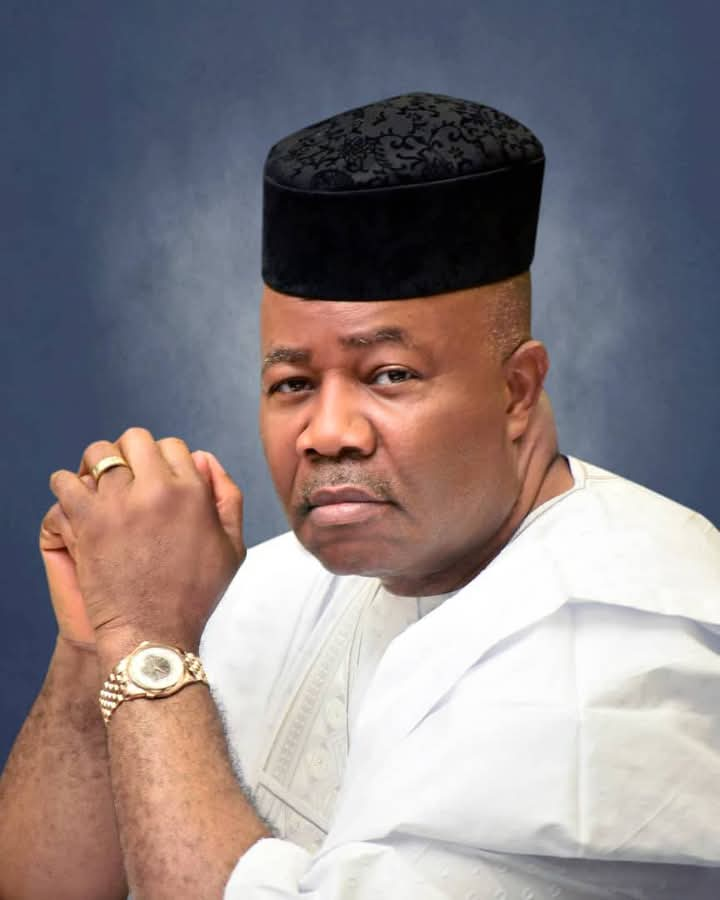By Hon Eseme Eyiboh
As Nigeria marks 26 years of uninterrupted democracy and commemorates the second anniversary of President Bola Ahmed Tinubu’s administration, it is timely to reflect on the pivotal role played by the 10th Senate under the leadership of Senator Godswill Akpabio. In two years, the Red Chamber has emerged as a beacon of legislative activism, fostering good governance through robust lawmaking, strategic oversight, and statesmanlike diplomacy.
From the beginning, the 10th Senate has exhibited uncommon legislative energy. With 844 bills introduced, 96 passed, and 52 assented to by the President, the upper legislative chamber has shown a commitment to addressing critical national issues. The laws span a wide spectrum—education reform, tax modernization, regional development, and enhanced local government autonomy—each crafted to deepen Nigeria’s democratic and developmental trajectory.
Among the key proposals still under deliberation is the Constitutional Amendment Bill, a potentially historic legislation seeking a single six-year presidential term, transition to a parliamentary system, and increased representation for women in governance. Other notable bills include the Police Act Amendment Bill, the National Ranchers Commission Bill, the NIMC Act Repeal Bill, and those advocating for Diaspora Voting and Special Legislative Seats for Women—all reflecting a Senate attuned to the evolving aspirations of Nigerians.
In a significant effort to overhaul Nigeria’s tax administration, the Senate adopted the harmonized version of the Tax Reform Bills proposed by President Tinubu. The Bills include the Joint Revenue Board ( Establishment) Bill, 2025, Nigeria Revenue Service ( Establishment ) Bill, 2025, Nigerian Tax Administration Bill, 2025, and Nigerian Tax Bill, 2025. The Bills, which are ready to be transmitted to the President for assent, will have tremendous impact on the economy by improving government Internally Generated Revenue, IGR. The reforms will also encourage domestic investment, streamline tax collection among the three tiers of government and eliminate double taxation. Additionally, the Law will close loopholes in Nigeria’s tax administration system, reduce tax burden on low income earners and improve their disposable income.
In all, the tax incentives are expected to promote economic diversification by enhancing investments in key sectors. Senate President Akpabio must be commended for his tact and ingenuity in handling the affairs of the Parliament that doused the initial misgivings in some quarters, including the Lawmakers, when the Bills where sent to the National Assembly. As at today, 17th June, 2025, the assented Bills received are: Federal College of Education, Bende, ( Establishment ) Bill, 2025, Federal University of Medical and Health Sciences , Item Bende, ( Establishment ) Bill, 2025, and Federal University, Okigwe, ( Establishment ) Bill, 2025.
Beyond lawmaking, Senator Akpabio has advanced a new model of Executive-Legislative engagement—one built on mutual respect rather than blind acquiescence. Under his stewardship, the Senate has secured improved budgetary allocations to the Armed Forces, Police, and intelligence agencies to tackle insecurity. Notably, his deft handling of the fuel subsidy removal crisis—through mediation and wide consultations—helped ease national tension and facilitated legislative buy-in for a tough, yet necessary policy shift.
Internally, the 10th Senate under Akpabio has matured into a united front. By deliberately allocating committee chairmanships across party lines and prioritizing national unity, he has ushered in an era of legislative harmony, replacing the factional wrangling that plagued past assemblies. This spirit of inclusivity was symbolically underscored when he ordered the restoration of the official portrait of former Senate President Bukola Saraki, a gesture that helped heal political wounds and uphold institutional continuity.
A landmark achievement of the current Senate is its commitment to restoring fiscal discipline by returning Nigeria to the January–December budget cycle. Senators, often working late nights and public holidays, ensured timely passage of Appropriation Bills. This has enabled early budget implementation, especially for capital projects—a critical boost for economic planning and delivery.
In the realm of oversight, the Akpabio-led Senate has raised the bar. When Nigerians grappled with persistent fuel scarcity, the Senate leadership embarked on a strategic visit to the Dangote Petroleum Refinery. That fact-finding mission not only exposed systemic irregularities in the oil sector but led to a decisive Presidential directive mandating NNPCL to sell crude to the refinery in naira, ultimately helping stabilize fuel prices.
Perhaps what stands out most in Akpabio’s stewardship is his ability to navigate Nigeria’s complex political landscape with bipartisan finesse. Twice in two years, his colleagues have passed a vote of confidence in his leadership—a testament to his inclusive style, strategic acumen, and unwavering focus on national progress.
As the 10th Senate continues its legislative journey, it remains an indispensable pillar in the realization of President Tinubu’s Renewed Hope Agenda. With Senator Akpabio at the helm, the Senate is not just a lawmaking body, but a dynamic engine for reform, stability, and transformation—working, as always, in the service of the Nigerian people.
Hon. Eseme Eyiboh is the Special Adviser, Media/Publicity and official Spokesperson to the President of the Senate.



